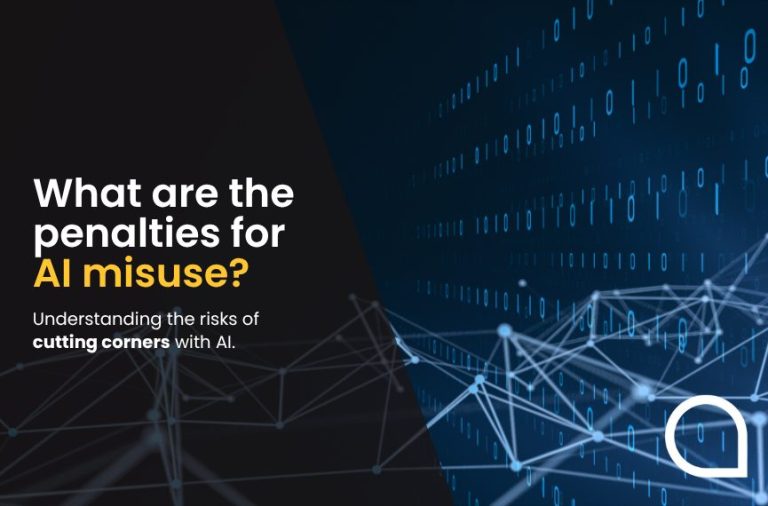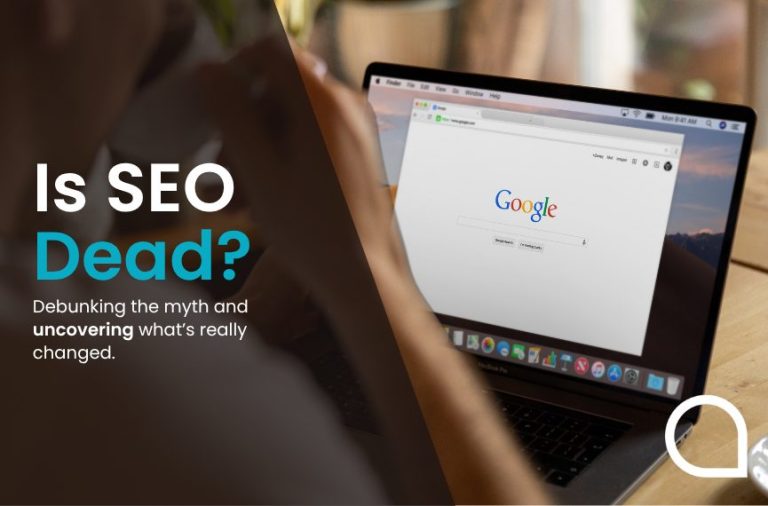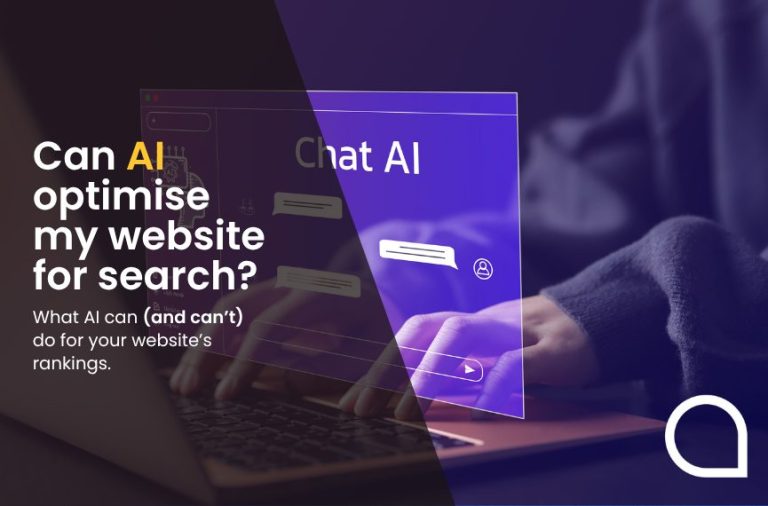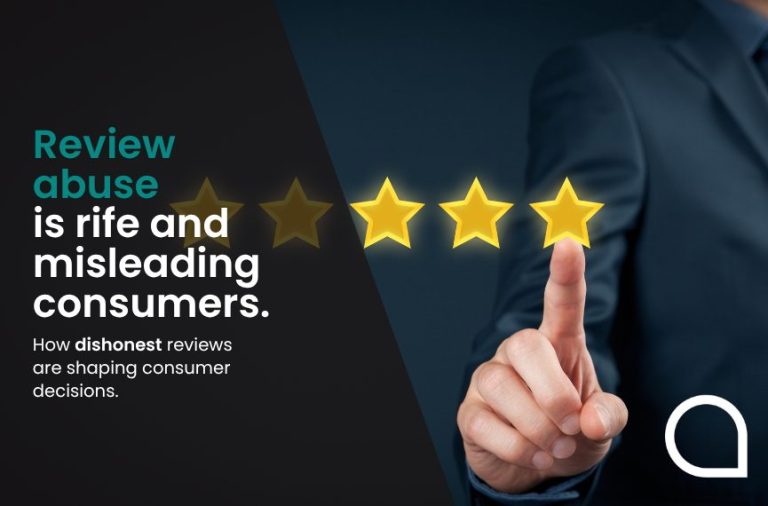
What are the penalties for AI misuse?
Embracing Artificial Intelligence (AI) whether for personal or professional use has clear advantages – and Google agrees. While it’s a common misconception that Google automatically
Content creation using AI writing tools is becoming increasingly popular – but where does Google stand on the rise of AI generated content?
Artificial intelligence (AI) is becoming increasingly proficient in generating high-quality, human-like content – with apps such as OpenAI’s ChatGPT gaining widespread attention in recent months for showcasing the advances in Natural Language Processing (NLP) techniques.
AI generated content has never felt so human, which might cause concern for hundreds of copywriters future job securities, as they fear the prospect that a machine might be able to do their job better and cheaper than they can.
While there is certainly an argument to be made for AI generated content, in our opinion, there will never be a substitute for content with a human touch. Machines are learning and they are getting smarter every day. But real content, created by a real person, will always be more authentic and more authoritative than anything a machine can produce – a view which Google also shares.
In this article, we’ll discuss Google’s current guidelines on AI generated content and speculate on when you might consider using AI for content creation for your website. But what exactly is AI generated content?
In layman’s terms, AI-generated content is copy or text that a machine has generated as opposed to a human. This is done using AI writing tools that utilise a language-based model to produce content based on instructions we provide. The machine will generate content from a combination of the text which we input and data it gathers from online resources.
AI content creation involves utilising AI tools, such as ChatGPT or Jasper AI, based on a mixture of variables that we enter into them – like keywords, phrases, topics and descriptions. It can use this information to create a wide variety of content – including:
The quality of AI-produced content can often vary. Some AI tools can curate content almost indistinguishable from that which a human copywriter can produce. Others churn out heavily flawed and unauthentic content which is very easy to spot.
Regardless of who or what created it, bad content isn’t hard to notice. You can detect bad content based on poor grammar or linguistic choices, as well as incorrect tone of voice, plagiarism, repetitiveness and the lack of variation. These rules also apply to bad AI-generated content.
Where things get trickier is when a good AI tool has been utilised. The likes of ChatGPT can create very good content that even a human might be guilty of second guessing. The fastest way to spot AI-generated content is by using an AI Content Detector, although some detectors are not always 100% accurate and there are some limitations, such as mislabelling both AI-generated and human-written text or potentially evading classifiers.
The biggest indicator for AI-generated content however is arguably originality. No content produced by a machine can be original content, as it borrows from search queries and online results to formulate what it creates. But can Google detect AI content?
Google’s position hasn’t changed much over the years when it comes to AI – if you’re using AI to try to leverage your position within in search engine results, this is a violation of their spam policies.
However, if AI generated content is created for people and not to try and trick a search engine, Google will still judge this accordingly as it would any other web page.
According to Google’s current guidelines:
“Appropriate use of AI or automation is not against our guidelines. This means that it is not used to generate content primarily to manipulate search rankings, which is against our spam policies.”
What Google deems as an appropriate use of AI is in creating people-first content that delivers on the E-E-A-T concept. In fact, Google acknowledges AI’s ability to generate helpful content like weather forecasts or transcripts.
As such Google will not ban AI generated content, so long as it meets the E-E-A-T criteria. However, if AI has been used to curate poor or spammy content, then Google will demote this accordingly.
We can help inform E-E-A-T scores in AI-generated content in a number of ways. At a page level, this needs human input, such as fact-checks and proofing before uploading a piece of AI written content to a website. We need to ensure that any page written by AI delivers on the search intent of a user, answering their query in a clear and as close to an original way as possible.
If we are using AI to create an article for example, and information on the experience of who is credited as writing the content will also help with the authority and expertise aspect of E-E-A-T.
Ensuring there is still a human element to any AI generated content will help keep this within Google’s guidelines and shouldn’t affect it’s potential to rank in search engine results.
If AI content is not created with E-E-A-T and a people-first approach in mind, then Google will treat this the same as it would any of form unhelpful or spammy content and prioritise ranking other pages instead. This is the only instance in which it would actively demote AI content.
The short version is “kind of”. Content created by older NLP models like GPT-1 and 2 is fairly easy for Google to spot. Newer models like GPT-3 is much more advanced than its predecessors, meaning it’s not as cut and dry for Google to detect AI.
Where Google can still detect AI generated content is its spam quality. As Google prioritises helpful, authentic, and trustworthy content in it’s search results, if AI is used to create spammy content, much like if a human produced it, Google would penalise this.
However, if the content which AI has created meets E-E-A-T thresholds, then Google can hypothetically still rank this, irrespective of how it was produced. As Google’s aim is to present users with the most helpful pieces of content to answer their search query, the method of how content was created is secondary – if it meets these guidelines.
While the future of AI and how Google views it remains to be seen, there are certainly arguments for using AI to produce content.
Tweaking product descriptions on e-commerce websites to help avoid cannibalisation and duplicate content issues on your website is a perfectly acceptable use of AI. Creating a new author profile or a team page for a new member with AI might come in useful if you find it difficult writing about yourself or about others.
Using AI to write a cornerstone article to compete for a high-volume keyword on the other hand, might cause issues as there are limitations in how original it’s content can be, which might hinder its ability to rank effectively. Similarly, using AI to create content purely designed to manipulate your ranking position on Google, will only end in failure.
Like any tool or software, there are risks involved if AI isn’t used correctly, but there are certainly opportunities to implement into how marketers – such as the examples highlighted above.
Ultimately, regardless of how AI writing tools are used, there always needs to be a human element involved, as there’s no substitute for what we can do.
We are a family-run digital marketing agency that has years of experience working with SEO, both on a national level and locally in Greater Manchester, Cheshire and Merseyside.
As a recent winner of Content Strategy of the Year at the European Content Awards, our services are backed by our ethos of trust, loyalty, and collaboration. We take the time to understand your needs and take your goals on board, fostering a relationship that’s productive from day 1.
If you need help with your SEO content writing, then we would love to be your trusted partner. To find out more about how we produce great SEO content for your brand, contact us today. We offer a free website audit and consultation to start you off on your journey to the top of Google.
Why pillar pages are the foundations of a successful content strategy
How to conduct a thorough digital marketing audit of your website
Why digital marketing is important to business owners
Digital marketing trends to get ahead of the curve
Short-form vs. long-form content: Which is better for your website?
Digital marketing channels: Which one should you choose?
Content Optimisation: How to improve existing content on your website
How AI is becoming more prominent in digital marketing
How to create a results-driven digital marketing campaign
SEO for YouTube: How to optimise YouTube videos for search
How to boost your website’s domain authority
What is Evergreen Content and why does it matter for SEO?
Why we build backlinks to your website
How to develop a content strategy for SEO
Content is King. What is content marketing?
Creating great content: How to write for SEO
How digital marketing has changed over the years
How video content can elevate your website
Top 20 Facts about Manchester You Never Knew
Aqueous Digital’s Ultimate Guide to the cost of SEO in the UK
Aqueous Digital’s Guide to the Top 501 SEO and Digital Marketing Terms
How video content can elevate your business

Embracing Artificial Intelligence (AI) whether for personal or professional use has clear advantages – and Google agrees. While it’s a common misconception that Google automatically

Whether it’s Google’s AI (artificial intelligence) Overviews or AI-powered SEO (search engine optimisation) tools, this emerging and fast-developing technology has fundamentally altered the SEO landscape.

The widespread creation and adoption of AI (artificial intelligence) tools has undoubtedly changed the way that search engine optimisation (SEO) services for websites are performed.

While Google enjoys the biggest share of the search engine market (around 90%, according to StatCounter), the second-largest search engine, Bing, shouldn’t be overlooked. Following Bing’s

Trust: online searchers are ready to give it, and businesses want to earn it as quickly as possible, but how can you accurately assess the

I wrote recently about the ridiculous situation of being asked to leave a review for a parking space, but what I encountered yesterday is, I